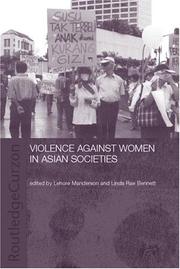| Listing 1 - 9 of 9 |
Sort by
|

ISBN: 9780415329293 0415329299 Year: 2005 Publisher: London RoutledgeCurzon
Abstract | Keywords | Export | Availability | Bookmark
 Loading...
Loading...Choose an application
- Reference Manager
- EndNote
- RefWorks (Direct export to RefWorks)
Single Person --- Islam --- Sexuality --- Social Environment --- Women --- Single women --- Sexual abstinence --- Femmes seules --- Continence --- Social conditions. --- Religious aspects --- Islam. --- Conditions sociales --- Aspect religieux --- Indonesia --- Indonésie --- Social life and customs. --- Moeurs et coutumes --- Sociology of culture --- Sexology --- Gynaecology. Obstetrics --- Social ethics --- Family law. Inheritance law --- Sociology of the family. Sociology of sexuality --- Reproductive health --- Singles --- Norms --- Reproductive rights --- Book

ISBN: 1134331568 1280165227 0203391381 9780203391389 9780415329293 0415329299 9786610165223 661016522X 0415329299 9781134331567 9781280165221 9781134331512 9781134331550 9780415448031 113433155X Year: 2005 Publisher: London New York RoutledgeCurzon
Abstract | Keywords | Export | Availability | Bookmark
 Loading...
Loading...Choose an application
- Reference Manager
- EndNote
- RefWorks (Direct export to RefWorks)
In popular debates about reproductive and sexual rights, formal religions, especially Islam, are seen as barriers providing institutional and ideological resistance to women's realization of reproductive and social autonomy. This book challenges this simplified view of Islam. Based on original fieldwork in Eastern Indonesia, the book explores the complex factors that affect how young Indonesian women form their sexual subjectivities, discusses the cultural and historical conditions under which single Muslim women repress or express their sexuality, and examines how the cultural context, includ
Single women --- Sexual abstinence --- Spinsters --- Unmarried women --- Single people --- Women --- Social conditions. --- Religious aspects --- Islam. --- Indonesia --- Social life and customs.
Book
ISBN: 180008076X 1800080751 Year: 2023 Publisher: UCL Press
Abstract | Keywords | Export | Availability | Bookmark
 Loading...
Loading...Choose an application
- Reference Manager
- EndNote
- RefWorks (Direct export to RefWorks)

ISBN: 0700717412 0700717420 1315029634 113687562X 9781136875625 1299867073 9781299867079 9781315029634 9780700717415 9780700717422 9781136875694 1136875697 9781136875762 113687576X Year: 2003 Publisher: London RoutledgeCurzon
Abstract | Keywords | Export | Availability | Bookmark
 Loading...
Loading...Choose an application
- Reference Manager
- EndNote
- RefWorks (Direct export to RefWorks)
Violence against women is a violation of women's human rights and a priority public health issue. It is endemic worldwide. While much has been written about it in industrialized societies, there has been relatively little attention given to such violence in Asian societies. This book addresses the structural and interpersonal violences to which women are subject, both under conditions of conflict and disruption, and where civil society is relatively ordered. It explores sexual violence and coercion, domestic violence, and violence within the broader community and the state, avoiding sensationa
Women --- Sex discrimination against women --- Crimes contre les femmes --- Violence envers les femmes --- Discrimination à l'égard des femmes --- Crimes against --- Violence against --- Discrimination à l'égard des femmes --- Discrimination against women --- Subordination of women --- Women, Discrimination against --- Human females --- Wimmin --- Woman --- Womon --- Womyn --- Criminology. Victimology --- Sociology of culture --- Islam --- Social problems --- Sociology of minorities --- Sociology of the family. Sociology of sexuality --- Cambodia --- India --- Myanmar --- Bangladesh --- Malaysia --- Feminism --- Sex discrimination --- Women's rights --- Male domination (Social structure) --- Females --- Human beings --- Femininity --- Violence --- Marriage --- Sexually transgressive behavior --- Rape --- Book --- Femicide --- Discrimination --- Domestic violence
Book
ISBN: 9781800080737 Year: 2023 Publisher: London : UCL Press,
Abstract | Keywords | Export | Availability | Bookmark
 Loading...
Loading...Choose an application
- Reference Manager
- EndNote
- RefWorks (Direct export to RefWorks)
"This timely volume responds to the epic impacts of cancer as a global phenomenon. Through the fine-grained lens of ethnography, the contributors present new thinking on how social, economic, race, gender and other structural inequalities intersect, compound and complicate health inequalities. Cancer experiences and impacts are explored across eleven countries: Argentina, Brazil, Denmark, France, Greece, India, Indonesia, Italy, Senegal, the United Kingdom and the United States. The volume engages with specific cancers from the point of primary prevention, to screening, diagnosis, treatment (or its absence), and end-of-life care.Cancer and the Politics of Care traverses new theoretical terrain through explicitly critiquing cancer interventions, their limitations and success, the politics that drive them, and their embeddedness in local cultures and value systems. It extends prior work on cancer, by incorporating the perspectives of patients and their families, 'at risk' groups and communities, health professionals, cancer advocates and educators, and patient navigators.The volume advances cross-cultural understandings of care, resisting simple dichotomies between caregiving and receiving, and reveals the fraught ethics of care that must be negotiated in resource-poor settings and stratified health systems. Its diversity and innovation ensures its wide utility among those working in and studying medical anthropology, social anthropology and other fields at the intersections of social science, medicine and health equity." --
Cancer --- Cancer therapy --- Cancer treatment --- Treatment. --- Therapy --- Neoplasms --- Health Inequities --- Social Determinants of Health. --- therapy. --- ethnology.
Book
ISBN: 1800080735 1800080743 Year: 2023 Publisher: London : UCL Press,
Abstract | Keywords | Export | Availability | Bookmark
 Loading...
Loading...Choose an application
- Reference Manager
- EndNote
- RefWorks (Direct export to RefWorks)
"This timely volume responds to the epic impacts of cancer as a global phenomenon. Through the fine-grained lens of ethnography, the contributors present new thinking on how social, economic, race, gender and other structural inequalities intersect, compound and complicate health inequalities. Cancer experiences and impacts are explored across eleven countries: Argentina, Brazil, Denmark, France, Greece, India, Indonesia, Italy, Senegal, the United Kingdom and the United States. The volume engages with specific cancers from the point of primary prevention, to screening, diagnosis, treatment (or its absence), and end-of-life care.Cancer and the Politics of Care traverses new theoretical terrain through explicitly critiquing cancer interventions, their limitations and success, the politics that drive them, and their embeddedness in local cultures and value systems. It extends prior work on cancer, by incorporating the perspectives of patients and their families, 'at risk' groups and communities, health professionals, cancer advocates and educators, and patient navigators.The volume advances cross-cultural understandings of care, resisting simple dichotomies between caregiving and receiving, and reveals the fraught ethics of care that must be negotiated in resource-poor settings and stratified health systems. Its diversity and innovation ensures its wide utility among those working in and studying medical anthropology, social anthropology and other fields at the intersections of social science, medicine and health equity." --
Cancer --- Neoplasms --- Health Inequities --- Social Determinants of Health. --- Treatment. --- therapy. --- ethnology. --- Health Inequities.
Book
Year: 2023 Publisher: London : UCL Press,
Abstract | Keywords | Export | Availability | Bookmark
 Loading...
Loading...Choose an application
- Reference Manager
- EndNote
- RefWorks (Direct export to RefWorks)
"This timely volume responds to the epic impacts of cancer as a global phenomenon. Through the fine-grained lens of ethnography, the contributors present new thinking on how social, economic, race, gender and other structural inequalities intersect, compound and complicate health inequalities. Cancer experiences and impacts are explored across eleven countries: Argentina, Brazil, Denmark, France, Greece, India, Indonesia, Italy, Senegal, the United Kingdom and the United States. The volume engages with specific cancers from the point of primary prevention, to screening, diagnosis, treatment (or its absence), and end-of-life care.Cancer and the Politics of Care traverses new theoretical terrain through explicitly critiquing cancer interventions, their limitations and success, the politics that drive them, and their embeddedness in local cultures and value systems. It extends prior work on cancer, by incorporating the perspectives of patients and their families, 'at risk' groups and communities, health professionals, cancer advocates and educators, and patient navigators.The volume advances cross-cultural understandings of care, resisting simple dichotomies between caregiving and receiving, and reveals the fraught ethics of care that must be negotiated in resource-poor settings and stratified health systems. Its diversity and innovation ensures its wide utility among those working in and studying medical anthropology, social anthropology and other fields at the intersections of social science, medicine and health equity." --
Book
Year: 2023 Publisher: London : UCL Press,
Abstract | Keywords | Export | Availability | Bookmark
 Loading...
Loading...Choose an application
- Reference Manager
- EndNote
- RefWorks (Direct export to RefWorks)
"This timely volume responds to the epic impacts of cancer as a global phenomenon. Through the fine-grained lens of ethnography, the contributors present new thinking on how social, economic, race, gender and other structural inequalities intersect, compound and complicate health inequalities. Cancer experiences and impacts are explored across eleven countries: Argentina, Brazil, Denmark, France, Greece, India, Indonesia, Italy, Senegal, the United Kingdom and the United States. The volume engages with specific cancers from the point of primary prevention, to screening, diagnosis, treatment (or its absence), and end-of-life care.Cancer and the Politics of Care traverses new theoretical terrain through explicitly critiquing cancer interventions, their limitations and success, the politics that drive them, and their embeddedness in local cultures and value systems. It extends prior work on cancer, by incorporating the perspectives of patients and their families, 'at risk' groups and communities, health professionals, cancer advocates and educators, and patient navigators.The volume advances cross-cultural understandings of care, resisting simple dichotomies between caregiving and receiving, and reveals the fraught ethics of care that must be negotiated in resource-poor settings and stratified health systems. Its diversity and innovation ensures its wide utility among those working in and studying medical anthropology, social anthropology and other fields at the intersections of social science, medicine and health equity." --
Book
Year: 2023 Publisher: London : UCL Press,
Abstract | Keywords | Export | Availability | Bookmark
 Loading...
Loading...Choose an application
- Reference Manager
- EndNote
- RefWorks (Direct export to RefWorks)
"This timely volume responds to the epic impacts of cancer as a global phenomenon. Through the fine-grained lens of ethnography, the contributors present new thinking on how social, economic, race, gender and other structural inequalities intersect, compound and complicate health inequalities. Cancer experiences and impacts are explored across eleven countries: Argentina, Brazil, Denmark, France, Greece, India, Indonesia, Italy, Senegal, the United Kingdom and the United States. The volume engages with specific cancers from the point of primary prevention, to screening, diagnosis, treatment (or its absence), and end-of-life care.Cancer and the Politics of Care traverses new theoretical terrain through explicitly critiquing cancer interventions, their limitations and success, the politics that drive them, and their embeddedness in local cultures and value systems. It extends prior work on cancer, by incorporating the perspectives of patients and their families, 'at risk' groups and communities, health professionals, cancer advocates and educators, and patient navigators.The volume advances cross-cultural understandings of care, resisting simple dichotomies between caregiving and receiving, and reveals the fraught ethics of care that must be negotiated in resource-poor settings and stratified health systems. Its diversity and innovation ensures its wide utility among those working in and studying medical anthropology, social anthropology and other fields at the intersections of social science, medicine and health equity." --
| Listing 1 - 9 of 9 |
Sort by
|

 Search
Search Feedback
Feedback About UniCat
About UniCat  Help
Help News
News